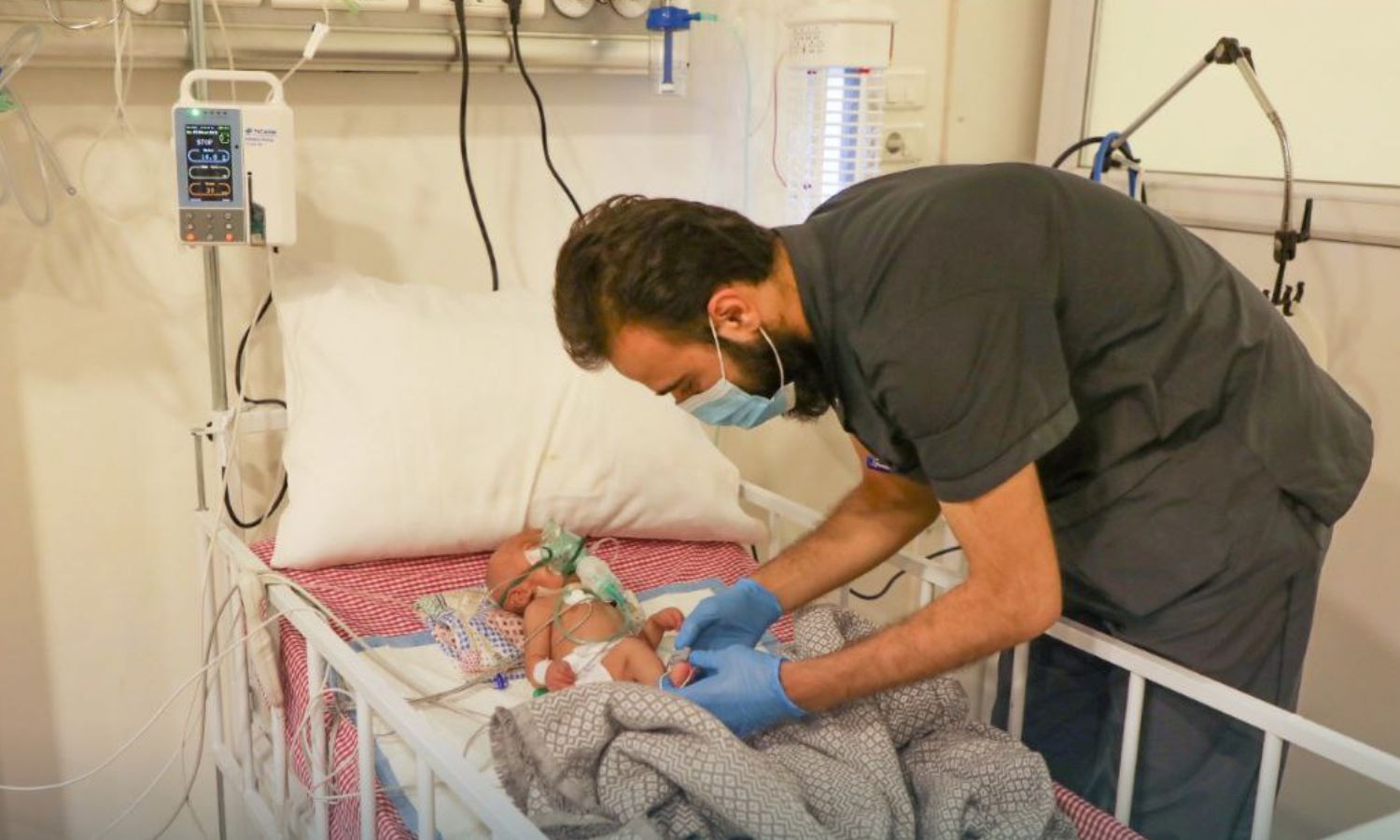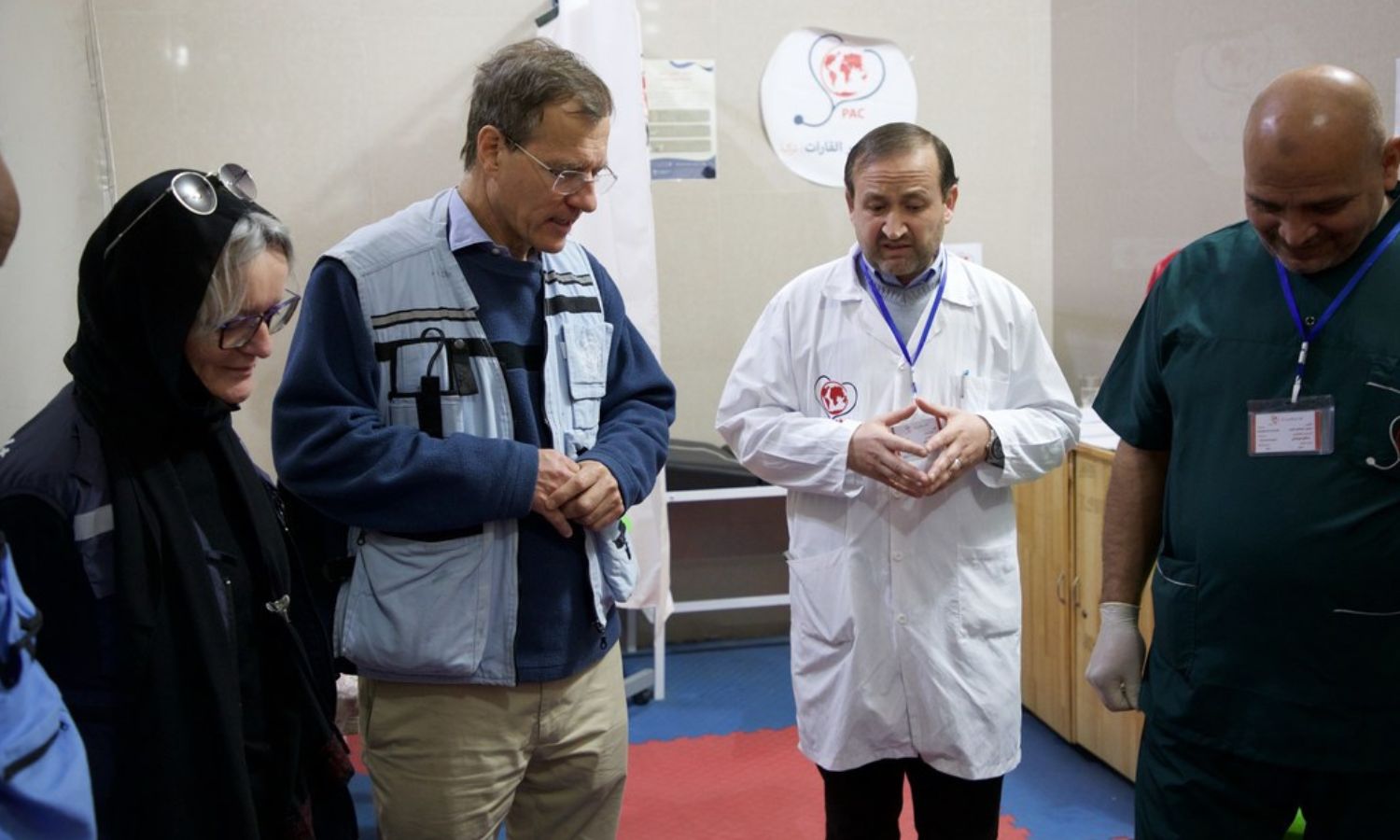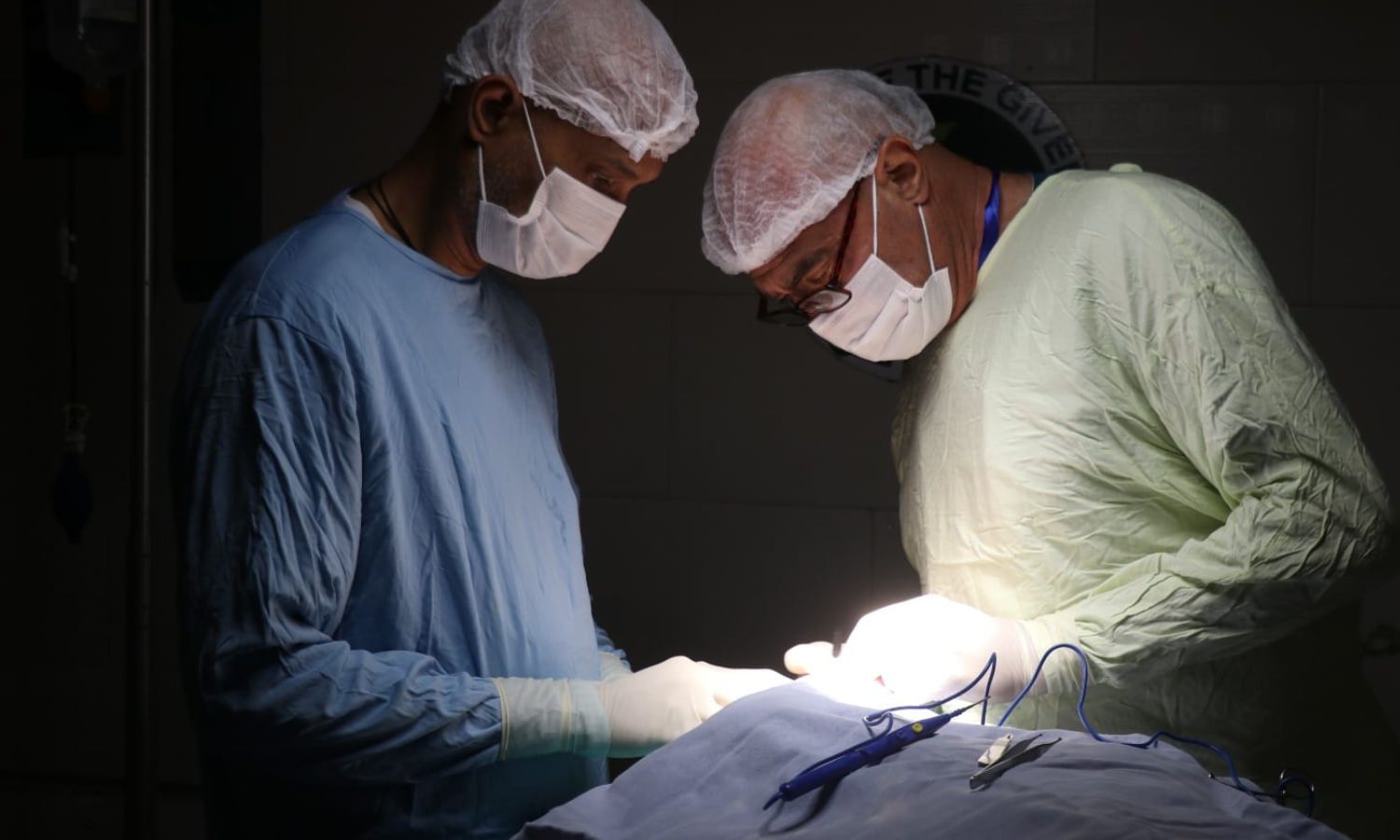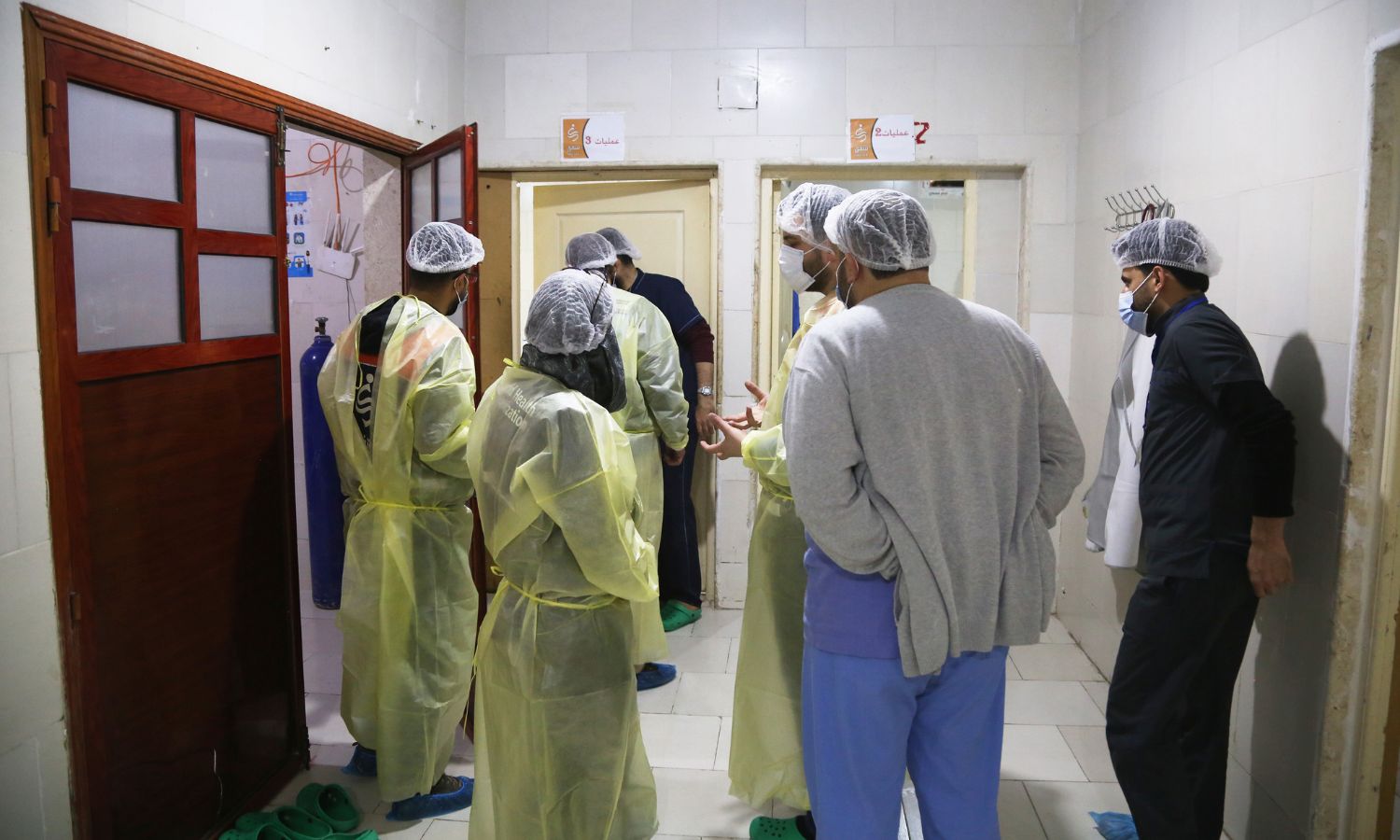Jana al-Issa | Hassan Ibrahim
In what has become an almost annual declaration, warnings from UN and local entities are emerging about the impending catastrophe facing the health sector in northwest Syria, affecting millions who need health services and care there.
Despite the poor medical services across Syrian geography, the situation in northwest Syria is the most challenging, as it relies entirely on external support, which has been noticeably dwindling for years amid a lack of priority from the de facto authorities.
In recent years, many medical facilities in the region have closed due to halted support, impacting the medical services received by residents of northwest Syria and adding additional pressure on the facilities that continue to provide minimal services to more than five million people.
Five million people affected
160 Facilities on the verge of closure
In mid-May, the United Nations Office for the Coordination of Humanitarian Affairs (OCHA) announced that approximately 160 health facilities, including 46 hospitals, would be forced to suspend operations by the end of June unless funding increases.
It is expected that more than 130,000 women and girls of childbearing age will give birth in 2024, but without adequate care, this could lead to preventable maternal deaths, according to OCHA.
Due to the decline in support, the UN has reduced its nutrition activities, including therapeutic feeding programs for children and the number of rapid response nutrition teams. Currently, 20,000 children are suffering from severe acute malnutrition.
Without sufficient support, 75,000 children suffering from moderate acute malnutrition could develop into severe acute malnutrition.
David Carden, Deputy Regional Humanitarian Coordinator for the Syrian crisis, said in an interview on the organization’s website at the beginning of June that the 2024 Syria Humanitarian Response Plan, which aims to raise over four billion dollars, has received less than 10% of what is required so far.
Carden emphasized that the lack of funding for the Humanitarian Response Plan has real consequences on the lives of the most vulnerable people in Syria, including northwest Syria, pointing out that if funding is not received, 160 health facilities will close by the end of June.
Northwest Syria is home to 5.1 million people, 4.2 million of whom need assistance, with 3.4 million facing food insecurity and 3.4 million being internally displaced. Two million live in camps, according to the United Nations, while local statistics speak of 5.5 to 6 million people.
At the beginning of this year, the World Health Organization (WHO) issued an urgent appeal regarding the health situation in Syria for 2024, indicating that the number of people in need of health services has reached 15.3 million, with 13 million targeted.
According to the report, the funding requirements for operations throughout Syria amount to 79.829 million US dollars, while funding requirements specifically for the World Health Organization’s emergency operations in Syria reach 53.428 million dollars.
The fear of medical facility closures in northwest Syria is not new; it recurs every year. However, what is different this time is the scale of the facilities that could be impacted, reaching 160 facilities.
Temporary solutions and emergency plans
In past years, support for some hospitals ceased, turning them into temporary centers for emergency or critical cases only when necessary.
With the threat of stopping support for other hospitals, an added burden weighs on hospitals and medical centers in the region, which already suffer from a lack of support, supplies, and medical equipment, overwhelmed by accepting more patients beyond their capacity.
Hospitals without support, others threatened
Dr. Molhem Ghazi, Director of Hospitals at the Syrian Salvation Government (SSG) in Idlib, told Enab Baladi that the number of public hospitals in the areas controlled by the Salvation Government is 60 hospitals, nine of which have completely lost their support so far, with no information available about the possibility of renewing support in the future. The number of private hospitals is 28, five of which are under preparation.
He added that several hospitals are at risk of losing full support within the next three months, numbering between 10 to 12 hospitals.
Ghazi noted that the volume of services provided by the health sector in Idlib and western rural Aleppo exceeds 90% compared to the needs, which is a good percentage, indicating that some few services are not fully available, such as some specialized surgeries like brain surgery and open-heart surgery, and other services, including some cancer doses and radiation therapy.
Dr. Ghazi said there is a comprehensive plan by the Ministry of Health if the health sector is significantly affected by the cessation of support. The plan includes identifying the areas most in need of medical services and activating hospitals that provide services to people either for free or for a nominal fee.
Dr. Jomaa al-Yasouf, Director of Primary Care at the Ministry of Health, said the number of health centers in Idlib city and western rural Aleppo is about 137 centers, most of which provide medical services in internal medicine, pediatrics, obstetrics, laboratory, nutrition, and also have pharmacies.
Al-Yasouf explained to Enab Baladi that the number of centers that will lose support at the beginning of July is about 22 centers, and the number of centers that will lose support at the beginning of October is about 16 centers.
He mentioned that each health center serves between 15,000 to 20,000 people, noting that the recommended number by the World Health Organization is between 10,000 to 25,000 people.
For its part, the Idlib Health Directorate, an independent body from the Salvation Government, stated that international grants funding the health sector in the region have decreased by 30% to 60%. The number of health centers that have lost or will lose support by the end of June in Idlib province is 22 centers, and this number will rise to 95 centers by the end of the year, with no signs or indications of new grants to support the operation of these centers.

Support ceased for dozens of health facilities in northern Syria and they now operate on an emergency basis – May 15, 2024 (Idlib Health Directorate)
Arrahma Hospital in emergency mode
Since the end of last April, a health crisis has threatened the lives of residents in the areas of Darkush, Harem, Salqin, and Jisr al-Shughour in western Idlib, after Arrahma Hospital in Darkush closed its doors to hundreds of patients due to a halt in support and shifted to emergency mode, only accepting emergency cases.
Arrahma Hospital is the only one in the western regions of the province, providing medical care to several major cities including Salqin, Harem, Darkush, and Jisr al-Shughour, and more than 30 villages and hundreds of camps housing over a million people. It is the second-largest hospital in Idlib province and western Aleppo countryside after Idlib University Hospital.
The hospital administration has taken several measures to ensure the reception of emergency cases temporarily after the support was cut off, relying on the small reserve stock, which could run out at any moment, leading to a complete halt in the hospital’s operations.
The media officer at Arrahma Hospital, Bahaa al-Suwaid, told Enab Baladi that the hospital was supported by the Syrian American Medical Society (SAMS), which cut off support entirely and without prior notice, something that had never happened before, even partially, forcing the hospital administration to operate on an emergency basis.
Al-Suwaid added that the hospital staff work voluntarily without wages, and the reserve stocks of medical consumables for emergency cases and surgical operations are very low and could run out at any moment, threatening the hospital’s ability to provide even basic medical care for severe cases.
Al-Suwaid mentioned that the hospital provides monthly healthcare to 30,000 beneficiaries, and the adult intensive care unit receives 195 cases and 105 pediatric intensive care cases monthly. The incubators department receives 100 children monthly, while the wards department receives between 300 to 400 patients monthly.
The specialized clinics at Arrahma Hospital provide medical services to more than 8,500 patients monthly, the laboratory department conducts more than 25,000 lab tests, the radiology department serves more than 3,000 patients, the emergency department receives 7,000 patients, and the hospital performs more than 750 major surgeries, according to the media officer.
Since the support stopped, the specialized clinics have only been seeing 30 patients daily compared to more than 70 patients daily previously, and surgeries are only performed for emergency cases now.
Al-Suwaid explained that all the solutions implemented by the administration are merely temporary emergency solutions for a very short period, considering that the solution lies in the resumption of support by the World Health Organization or other humanitarian organizations.
A stoppage that threatens patients’ lives
The halt in support for Arrahma Hospital in Darkush poses a new crisis for citizens who cannot afford the cost of treatment in private hospitals or travel to receive treatment in distant areas.
Enab Baladi interviewed some locals in the area, including patients, who described the hospital’s shift to emergency cases only as “catastrophic,” including Saeed al-Muhammad (40 years old), a displaced person living in Darkush. His four-year-old daughter suffers from neurological diseases that cause severe seizures, necessitating visits to Arrahma Hospital two or three times weekly.
Al-Muhammad fears for his daughter’s life as she suffers from a neurological disease due to a high fever that caused brain diseases. She requires long-term treatment and constant medical care. He told Enab Baladi that he cannot afford treatment in private centers or the cost of traveling to public hospitals in Idlib, which is about 40 kilometers from his residence.
A “temporary” roadmap
A series of meetings conducted by the Idlib Health Directorate with health facilities and primary health care center directors resulted in proposals to help mitigate the “catastrophic effects” of the support reduction. They came up with several proposals forming a roadmap for the upcoming period, including:
- Merging services of nearby health centers.
- Scheduling medical services in the center according to priority, directing available support to cover services based on priority.
- Rescheduling salaries.
- Activating the role of the local community in supporting primary health centers through donations.
- Unifying treatment protocols at all centers and strictly enforcing them to reduce medication wastage.
- Implementing a two-day weekly holiday to reduce operational costs and materials consumption.
- Proposing telemedicine services for clinics that do not require a physical examination to reduce primary care costs.
- Prioritizing the dispensing of medications to chronic disease drugs only.
- Utilizing recent graduates to fill the gap in case of complete support cessation.
- Automating center operations to reduce paper, printer, and other consumptions.
- Imposing nominal fees on non-emergency services.
The head of the research and development division at the Idlib Health Directorate, Mohamed Ghazal, told Enab Baladi that the halt in support for some hospitals has put pressure on other hospitals and centers. Some have resorted to volunteer work to avoid depriving patients of medical services.
He mentioned to Enab Baladi that the directorate is currently holding meetings with organizations and hospital and health center directors, with plans to implement the proposed outcomes as soon as possible, noting that these proposals require coordination among the mentioned parties and are open to development.
Ghazal added that the proposed roadmap is a partial solution to the support reduction crisis and is expected to continue until the problem is resolved, either through the resumption of support or finding new donors.
Pain-soothing attempts
From time to time, organizations and associations provide projects and initiatives to treat patients with “special” surgeries for free, including the announcement by the Syrian American Medical Society (SAMS) of a project to provide full support for 48 open-heart surgeries for free, starting at the beginning of last May.
Heart patients in Idlib suffer from the lack of free centers for surgical operations and the high cost of such surgeries, which can reach up to $5,000, not to mention the cost of post-surgery rehabilitation treatment. SAMS covers the costs of these operations and oversees their implementation.
In addition to local efforts, some patients are taken to Turkey for special operations, such as cancer patients, but it is not easy. Entry was complicated after the February 2023 earthquake, when Turkish authorities stopped admitting Syrians for treatment, then allowed their entry in batches in June of the same year.
In early May, the Al-Ameen organization completed the first phase of the hearing rehabilitation and cochlear implantation program in the city of Reyhanli in southern Turkey, supported and funded by the King Salman Humanitarian Aid and Relief Center.
The medical team conducted 30 cochlear implant surgeries for children from northern Syria, fitted 200 hearing aids, and performed 10 surgeries in the fields of ear, nose, and throat specialties.

David Carden, Deputy Regional Humanitarian Coordinator for the Syria crisis, visits a clinic in northwest Syria (UN)
Expert: Nine solutions towards a stable future for the health sector
The medical reality in northwestern Syria and the temporary solutions adopted by local or international organizations raise questions about the future of the sector, given its complete reliance on support that is by no means stable.
In recent years, the health sector in northwestern Syria has demonstrated its resilience and ability to adapt. Therefore, it is likely that this sector will adopt alternative strategies focused on building local capacities and reducing reliance on external support, according to Dr. Munther Khalil, a researcher in the Health System Strengthening project in northern Syria and former Director of Health in Idlib.
Khalil added in a conversation with Enab Baladi, that with the decline in funding, it is expected that the private and charitable sectors will grow. He noted that the ability of local health actors to adopt several solutions can ensure a smooth transition to the next stages without significant collapses in the health sector in the area.
Khalil proposed several long-term solutions to prevent a collapse in the sector, summarized in nine interconnected solutions:
- Building a sustainable health system: Focus on developing a health system capable of dealing with ongoing challenges. This includes training local medical staff, improving health infrastructure, providing medicines and medical equipment, and securing continuous operational costs.
- Enhancing the legitimacy of the health system: The legitimacy of the health system is mainly derived from the community’s perception of its management methods, the values it embraces, and its ability to continuously provide high-quality health services. This enhances community ownership and voluntary compliance with health authorities’ instructions and also provides protection for health facilities and medical staff. It also increases the chance for local public health authorities to be partners with the international community in the early recovery and reconstruction phase.
- Strengthening international partnerships: Establishing partnerships with international organizations and governments to secure sustainable funding and long-term technical support. At this stage, it is essential to seek out potential development partners.
- Developing fair health policies: Implementing health policies based on accurate and reliable data that ensure the equitable distribution of resources and health services while taking into account the significant changes in the region’s demographic structure. It is also important to ensure equitable service delivery to vulnerable groups, including persons with disabilities.
- Engaging local communities: Involving local communities in developing and implementing health solutions to ensure they meet real needs and make optimal use of resources, thereby enhancing ownership and adoption of these solutions.
- Neutralizing the health system from local political and military conflicts: Maintaining the neutrality and technical nature of the health sector and avoiding its exploitation for narrow factional or partisan projects.
- Developing sustainable financial policies: With the ongoing decline in funding, it is not feasible to continue providing entirely free services. Therefore, some services within health facilities should be transformed into paid services.
- Enhancing the private and charitable sectors: Strengthening the private and charitable sectors to cover advanced services that cannot be provided for free in organization-supported facilities and to relieve pressure on public facilities.
- Maintaining the flow of cross-border aid: In the absence of a political solution, the flow of cross-border health aid cannot be dispensed with.
Dr. Munther Khalil sees that the responsibility for adhering to these sustainable solutions lies with multiple parties, including local governments, health directorates, Syrian NGOs, local communities, international organizations like WHO, and donor countries. He emphasizes that joint cooperation among these parties is the key to achieving sustainable solutions.
Mazen Kewara, Director of the Turkey and Northern Syria Office at the Syrian American Medical Society (SAMS), believes that the decline in healthcare funding has become an ongoing reality, associated with a general reduction in humanitarian aid across various sectors concerning the Syrian issue.
Kewara explained to Enab Baladi that this situation started around 2019 but noted the health sector has received intermittent boosts during disasters such as the spread of the coronavirus (COVID-19) or the earthquake on February 6, 2023.
Regarding long-term solutions to avoid a catastrophe in the health sector, Dr. Kewara proposed several solutions, the most notable being the consideration of strategic health projects in northwestern Syria.
These projects involve large medical facilities that provide various resources and reduce competition. For instance, gathering resources in one large medical facility instead of multiple small hospitals can save a significant amount on administrative costs and resources for health workers.
Among the solutions proposed by Kewara is supporting the partnership between organizations working in the health sector and the emerging private sector in the region, similar to the recent efforts by SAMS. The private sector should be supported to play its role in health response.
Given these facts, Dr. Kewara considers that the recovery of the health sector should occur alongside the recovery of other key sectors, mainly the economic sector. This can be achieved by improving people’s incomes to bear the burdens and costs of health problems or increasing the resources of institutions, organizations, and the public sector to alleviate the burden as well.
if you think the article contain wrong information or you have additional details Send Correction
النسخة العربية من المقال
-
Follow us :













 Conducting surgical operations inside Arrahma Hospital, western Idlib - May 3, 2023 (Arrahma Hospital)
Conducting surgical operations inside Arrahma Hospital, western Idlib - May 3, 2023 (Arrahma Hospital)





 A
A
A
A
A
A









 More In-Depth
More In-Depth